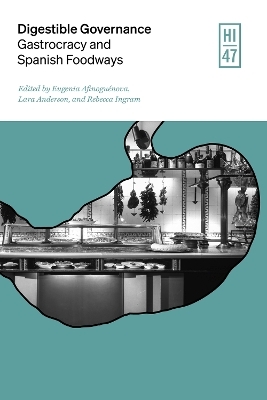
Digestible Governance
Vanderbilt University Press (Verlag)
978-0-8265-0708-2 (ISBN)
The term “gastrocracy” refers to the appropriation of discourses and practices related to the sourcing, preparation, distribution, and consumption of food for political purposes. The intersections of gastronomy and governance, dating in Spain to the last quarter of the nineteenth century, have become highly visible over the past decade, when political debates around nationalism in its different forms have taken the guise of discussions about regional and local cuisines. Concomitant with the rise of the “slow food” movement and following UNESCO’s addition in 2011 of “Gastronomic Meal of the French” to its list of Intangible Cultural Heritage of Humanity, public and private associations all around Spain have been established with the goal of achieving recognition by UNESCO for Spanish, Catalan, and other national cuisines. In 2016, Gastro Marca EspaÑa—an association and a web portal—was launched to raise the profile of food in Spain’s national brand.
Eliciting wide public participation, coopted for political purposes, regarded as a factor of economic development on any scale, and integrated into every so-called banal nationalism, the production, distribution, and consumption of food are highly relevant for historical analysis. Seeking to encourage a broader discussion about Peninsular gastrocracies, this book brings together an interdisciplinary group of scholars from different sides of the Atlantic and the Pacific who have spearheaded research on gastronomy and governance in Spain.
Eugenia AfinoguÉnova is a professor of Spanish at Marquette University. Lara Anderson is an associate professor of Spanish and Latin American studies. Rebecca Ingram is a professor of Spanish at the University of San Diego.
Introduction: Digestible Governance: Gastrocracy and Spanish Foodways (Eugenia AfinoguÉnova, Lara Anderson, and Rebecca Ingram)
Section I: Gastropolitics
Chapter 1: Public Control over Private Trade: Barcelona’s Market-Hall Based Food Retailing System (Montserrat Miller)
Chapter 2: Regenerating Catalan Culinary Identity (H. Rosi Song)
Chapter 3: Francoist Food Culture in Post-Authoritarian Spain: Culinary Maps, Centralism, and Food Memories (Lara Anderson)
Section II: Ingestible Identities
Chapter 4: Food Fights: Nativism and Culinary Xenophobia in Europe (Aitana Guia)
Chapter 5: Kashrut in Spain: Religious Observance, State Tolerance, or Niche Market Entrepreneurship? (Silvina Schammah Gesser and Susy Gruss)
Chapter 6: Culinary Conflict or Convivencia? Halal Food Practices, Perceptions, and Promotion in Spain (Jessica Boll)
Section III: Gastrocratic Institutions
Chapter 7: The Institutionalization of the Asturian espicha during the Franco Regime (Luis Benito GarcÍa Álvarez)
Chapter 8: Cava’s Place (Robert Davidson)
Chapter 9: Food, Heritage, and Tourism: On the Uses of Food Heritage and Its Relations with Culture, Politics, and Socioeconomic Development (F. Xavier Medina)
Section IV: Hard to Swallow
Chapter 10: Ideology “a la carte”: Food Politics in Franco’s Spain (Suzanne Dunai)
Chapter 11: Creating a “Land of Charcuterie”: Cured Meat Producers, Culinary Marketing, and the Construction of Gastronationalist Discourses in Twentieth-Century Catalonia (Alex GÓmez del Moral)
Notes
Bibliography
Index
| Erscheinungsdatum | 12.08.2024 |
|---|---|
| Reihe/Serie | Hispanic Issues |
| Zusatzinfo | 9 b&w images |
| Verlagsort | Tennessee |
| Sprache | englisch |
| Maße | 152 x 229 mm |
| Themenwelt | Sachbuch/Ratgeber ► Essen / Trinken ► Länderküchen |
| Reisen ► Hotel- / Restaurantführer ► Europa | |
| Geisteswissenschaften ► Geschichte ► Regional- / Ländergeschichte | |
| ISBN-10 | 0-8265-0708-5 / 0826507085 |
| ISBN-13 | 978-0-8265-0708-2 / 9780826507082 |
| Zustand | Neuware |
| Haben Sie eine Frage zum Produkt? |
aus dem Bereich


